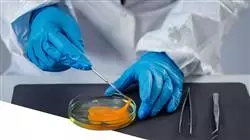University certificate
The world's largest faculty of nutrition”
Introduction to the Program
This is the best Postgraduate certificate program in Bromatology and the only one that will help you propel your professional career to the fulfillment of your goals"

Nowadays, the study of food and its chemical composition has become an important science because it allows to know the nutritional value and the influence that food processing generates in its characteristics. In addition, this area also manages to address issues related to environmental sustainability during the food production process and the application of new technologies in the processing of the products of this industry.
The program of the Postgraduate certificate in Food Bromatology is broad and includes important aspects such as the nutritional needs of the organism and the foods that can supply them. In addition, the student will achieve an advanced knowledge of the correct way to carry out an evaluation of bromatological elements, through the mastery of elements of nutritional value.
In addition, the participants of this degree will learn the set of concepts that determine the composition of animal and vegetable products, especially dairy, meat, vegetables and fruits. In this way, the student will be able to build health promotion activities that integrate the benefits of each food according to its type.
And all of this, thanks to the innovative Relearning methodology, which allows students to learn 100% online, making their schedules more flexible and allowing them to access the multimedia resources available 24 hours a day from any device connected to the Internet. In addition, your problem-solving skills will be strengthened, since you will analyze practical cases that will place you in simulations of real scenarios.
Thanks to this program, you will be the best in your field and elevate your career to a higher level"
This Postgraduate certificate in Food Bromatology contains the most complete and up-to-date scientific program on the market. The most important features include:
- The development of case studies presented by experts in Food Bromatology
- The graphic, schematic, and practical contents with which they are created, provide scientific and practical information on the disciplines that are essential for professional practice
- Practical exercises where the self-assessment process can be carried out to improve learning
- Its special emphasis on innovative methodologies
- Theoretical lessons, questions to the expert, debate forums on controversial topics, and individual reflection assignments
- Content that is accessible from any fixed or portable device with an Internet connection
TECH allows you to learn at your own pace and without the need to submit to rigid study schedules"
The program’s teaching staff includes professionals from the sector who contribute their work experience to this training program, as well as renowned specialists from leading societies and prestigious universities.
Its multimedia content, developed with the latest educational technology, will provide the professional with situated and contextual learning, i.e., a simulated environment that will provide an immersive education programmed to learn in real situations.
The design of this program focuses on Problem-Based Learning, by means of which the professional must try to solve the different professional practice situations that are presented throughout the academic course. This will be done with the help of an innovative system of interactive videos made by renowned experts.
Deepen your understanding of nutrient analysis and food characteristics from the comfort of your own home"

Gain an understanding of the nutritional value of foods such as milk and meat, in order to determine the best portions of these foods within a diet"
Why study at TECH?
TECH is the world’s largest online university. With an impressive catalog of more than 14,000 university programs available in 11 languages, it is positioned as a leader in employability, with a 99% job placement rate. In addition, it relies on an enormous faculty of more than 6,000 professors of the highest international renown.

Study at the world's largest online university and guarantee your professional success. The future starts at TECH”
The world’s best online university according to FORBES
The prestigious Forbes magazine, specialized in business and finance, has highlighted TECH as “the world's best online university” This is what they have recently stated in an article in their digital edition in which they echo the success story of this institution, “thanks to the academic offer it provides, the selection of its teaching staff, and an innovative learning method aimed at educating the professionals of the future”
A revolutionary study method, a cutting-edge faculty and a practical focus: the key to TECH's success.
The most complete study plans on the university scene
TECH offers the most complete study plans on the university scene, with syllabuses that cover fundamental concepts and, at the same time, the main scientific advances in their specific scientific areas. In addition, these programs are continuously being updated to guarantee students the academic vanguard and the most in-demand professional skills. In this way, the university's qualifications provide its graduates with a significant advantage to propel their careers to success.
TECH offers the most comprehensive and intensive study plans on the current university scene.
A world-class teaching staff
TECH's teaching staff is made up of more than 6,000 professors with the highest international recognition. Professors, researchers and top executives of multinational companies, including Isaiah Covington, performance coach of the Boston Celtics; Magda Romanska, principal investigator at Harvard MetaLAB; Ignacio Wistumba, chairman of the department of translational molecular pathology at MD Anderson Cancer Center; and D.W. Pine, creative director of TIME magazine, among others.
Internationally renowned experts, specialized in different branches of Health, Technology, Communication and Business, form part of the TECH faculty.
A unique learning method
TECH is the first university to use Relearning in all its programs. It is the best online learning methodology, accredited with international teaching quality certifications, provided by prestigious educational agencies. In addition, this disruptive educational model is complemented with the “Case Method”, thereby setting up a unique online teaching strategy. Innovative teaching resources are also implemented, including detailed videos, infographics and interactive summaries.
TECH combines Relearning and the Case Method in all its university programs to guarantee excellent theoretical and practical learning, studying whenever and wherever you want.
The world's largest online university
TECH is the world’s largest online university. We are the largest educational institution, with the best and widest online educational catalog, one hundred percent online and covering the vast majority of areas of knowledge. We offer a large selection of our own degrees and accredited online undergraduate and postgraduate degrees. In total, more than 14,000 university degrees, in eleven different languages, make us the largest educational largest in the world.
TECH has the world's most extensive catalog of academic and official programs, available in more than 11 languages.
Google Premier Partner
The American technology giant has awarded TECH the Google Google Premier Partner badge. This award, which is only available to 3% of the world's companies, highlights the efficient, flexible and tailored experience that this university provides to students. The recognition as a Google Premier Partner not only accredits the maximum rigor, performance and investment in TECH's digital infrastructures, but also places this university as one of the world's leading technology companies.
Google has positioned TECH in the top 3% of the world's most important technology companies by awarding it its Google Premier Partner badge.
The official online university of the NBA
TECH is the official online university of the NBA. Thanks to our agreement with the biggest league in basketball, we offer our students exclusive university programs, as well as a wide variety of educational resources focused on the business of the league and other areas of the sports industry. Each program is made up of a uniquely designed syllabus and features exceptional guest hosts: professionals with a distinguished sports background who will offer their expertise on the most relevant topics.
TECH has been selected by the NBA, the world's top basketball league, as its official online university.
The top-rated university by its students
Students have positioned TECH as the world's top-rated university on the main review websites, with a highest rating of 4.9 out of 5, obtained from more than 1,000 reviews. These results consolidate TECH as the benchmark university institution at an international level, reflecting the excellence and positive impact of its educational model.” reflecting the excellence and positive impact of its educational model.”
TECH is the world’s top-rated university by its students.
Leaders in employability
TECH has managed to become the leading university in employability. 99% of its students obtain jobs in the academic field they have studied, within one year of completing any of the university's programs. A similar number achieve immediate career enhancement. All this thanks to a study methodology that bases its effectiveness on the acquisition of practical skills, which are absolutely necessary for professional development.
99% of TECH graduates find a job within a year of completing their studies.
Postgraduate Certificate in Food Bromatology
Food bromatology is a branch of food science devoted to the study of food from a chemical, biological and nutritional perspective. In the Postgraduate Certificate in Food Bromatology, students will learn the fundamental principles of food chemistry and microbiology, as well as the analytical techniques used in the field of bromatology.
The Postgraduate Certificate in Food Bromatology is designed for students who are interested in the study of food chemistry and microbiology, as well as the analysis techniques used in the field of bromatology.
In addition, the course curriculum includes topics related to food safety and legislation, nutritional assessment and food quality. Students will also become familiar with the technologies used in the food industry for food preservation and processing. Upon completion of the course, students will be prepared to address current and future challenges in the food sector, and contribute to the development of healthy and sustainable food policies and practices.
The Postgraduate Certificate in Food Science and Technology is designed to prepare students to meet the current and future challenges of the food sector, and contribute to the development of healthy and sustainable food policies and practices.
A growing career: Postgraduate Certificate in Food Bromatology
The food sector is one of the most important and dynamic sectors worldwide, and food bromatology is a discipline in constant growth. The Postgraduate Certificate in Food Bromatology offers students a unique opportunity to train in a career with great potential for professional development.
The Postgraduate Certificate in Food Bromatology offers students a unique opportunity to train in a career with great potential for professional development.
Graduates of the Postgraduate Certificate will be able to work in companies in the food sector, in food analysis laboratories, in government agencies in charge of food regulation and inspection, and in non-profit organizations dedicated to the promotion of healthy and sustainable food. In addition, they will be able to continue their training in postgraduate programs in areas related to food and nutrition. In short, the Postgraduate Certificate in Food Bromatology is an excellent choice for those seeking a career in a constantly evolving field with great importance to society.
"







